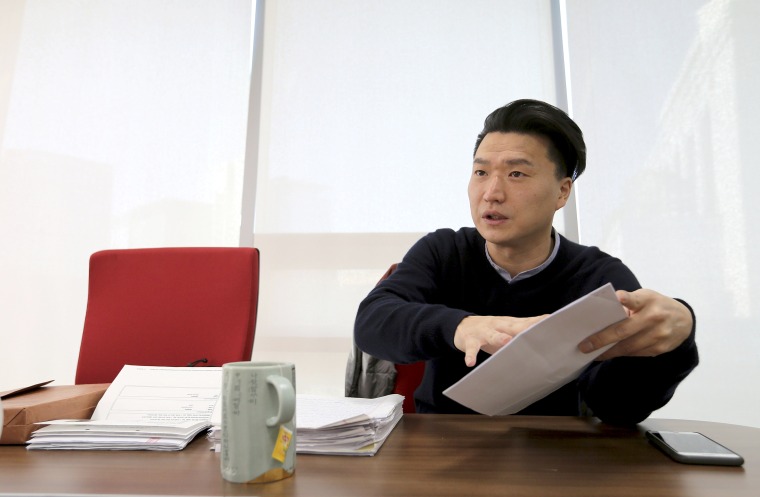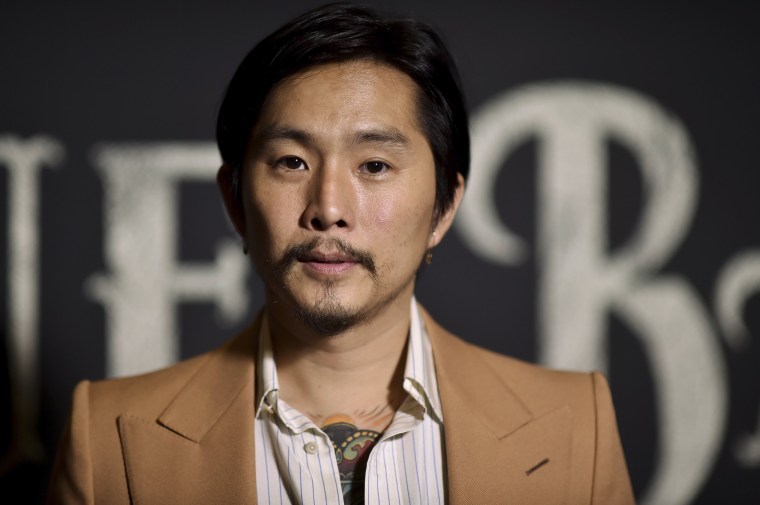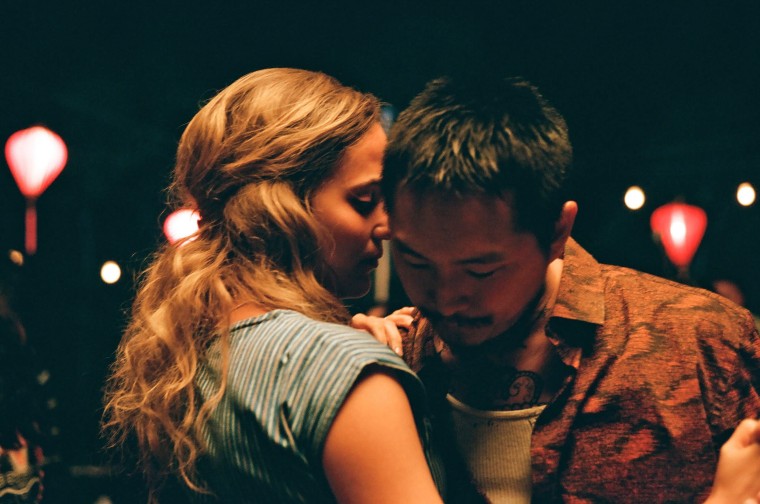A new film about an adoptee facing deportation is getting pushback from some Asian American adoptee groups and advocates who say it exploits one community member’s trauma, and it has also raised questions over ethical filmmaking.
Many in the adoptee community have spoken out against “Blue Bayou,” a film by director Justin Chon, after Adam Crapser, a Korean adoptee who was deported in 2016, claimed in a statement last week that the movie appropriates his story without his consent. Crapser, perhaps the most high-profile case of adoptee deportation, also told NBC Asian America that he was never involved with the filmmaking process, even though many elements of his own story closely resembled plot points in the film.
Hundreds of advocates have since signed a petition, including members of Adoptees for Justice, a transnational advocacy nonprofit group that Crapser is involved in, calling for a boycott of the film. "Blue Bayou" highlights how many adoptees could face deportation because they have never undergone naturalization. Legislation passed in 2001 ensured that all adopted children and any new adoptees would automatically obtain citizenship. But those older than 18 when the law was enacted weren’t covered.
“People who have experienced difficult things deserve the dignity to tell their story when and if they’re ready," Crapser said in a statement. "When that is taken away — when personal traumas are forcefully misappropriated for other people’s purposes— it is hurtful. I ask Justin and his team to stop using other people’s trauma to support his Hollywood ambitions, and for my friends to speak the truth about this film."
Crapser said that there’s still a way to move forward, adding that he'd like Chon to issue an apology and work with Adoptees for Justice.

"If he wants to have a conversation with me, great,” Crapser said. “I don't hate Justin. ... I feel personally violated and attacked because he nor his producer made me feel like they could empathize at all, with what it was I was actually living through.”
Some of the parallels between Crapser’s life and the film’s main character, Antonio LeBlanc, include their ages at adoption, and having a pregnant partner who encounters the Immigration and Customs Enforcement agency and an abusive adoptive father.
Focus Features, the studio that produced the film, provided a statement from Adoptee Advocacy, a recently formed group that includes some members who consulted during the production on issues related to adoption. The statement didn’t name Crapser, but said they “see strong similarities to many of our histories: abusive families, getting in trouble with law, being deported while leaving behind small children.”
The group also calls the boycott a “devastating gut punch to us.”
“We see 'Blue Bayou' as a chance to shine a light on the injustice we have suffered, yet it is our own community that is now piling another injustice on us,” the statement said. “We were abandoned by our country, and now we are being abandoned by people we thought were our brothers and sisters.”

Chon, who is not an adoptee and also stars as the movie's main character, said in a statement Monday that he had involved 13 adoptees, as well as a Korean American immigration lawyer, in the filmmaking process. “Every draft” of the film was shared with the “core” adoptees, he said. Chon also did not name Crapser, writing that the film “is not about one person.”
“I understand that much of many adoptees’ lives have been void of choice. The choice of where they would live, the choice of whom their adoptive parents were, even sometimes the choice of when or even IF they wanted to look for their birth parents,” Chon wrote. “This is NOT my story nor do I claim to understand what it feels like to be an adoptee. I made this film because I became aware of an inhumane policy that needs attention. I hope that this film can continue to bring awareness to the impacted adoptees in this country.”
Crapser gained national attention years ago when he attempted to fight his deportation case. He was adopted from South Korea by U.S. parents when he was 3, and his parents abandoned him and his older sister seven years later. The siblings were then separated in the foster care system. He was eventually adopted for a second time by Thomas and Dolly Crapser, who abused him and kicked him out of the house over an argument about phone usage. The adoptee was convicted of burglary after he broke into his parents' home in an attempt to retrieve some of his belongings from Korea. He was later convicted of several other offenses, but eventually established a stable life. (Crapser's parents were convicted of several counts of criminal mistreatment and assault. His father was also convicted on one count of sexual abuse.)
It wasn't until Crapser applied to renew his green card that federal officials were made aware of his old offenses, prompting a legal battle to stay in the country. Crapser has since sued South Korea and Holt Children's Services, a private adoption agency, accusing them of gross negligence for how he and thousands of Korean children were adopted without regard for their future citizenship.
Crapser said that Chon reached out to him in 2017 over Facebook. In messages viewed by NBC Asian America, Chon indicated that he had read articles about Crapser’s life and, moved by what he saw, was interested in learning more. (Chon has confirmed that he reached out to Crasper.)
“I feel like everyone in the U.S. should know what happened to you because it’s ridiculous,” the message from Chon read.
Crapser replied, offering to connect Chon with actor Daniel Dae Kim, who had previously approached him about the subject. Crapser never received a response, he said.
Years later, Crapser said he received a message from Chon’s production team asking for personal photos to be featured at the end of the movie, including one with his adoptive parents, who had been widely reported to be abusive.
Crapser said he told the team that he was not interested in the project and did not consent to his likeness being used in the film.
“I was not going to allow them to exploit me that way by asking me for pictures with my adoptive parents, which he's never gone through that level of abuse,” Crapser said.
Crapser’s image was not used in the film.
“Had Justin reached out to me personally and we were able to have some kind of a discourse about this, I think that there could have been some valuable information taken away from this movie,” Crapser said.
Becky Belcore, executive director of the National Korean American Service and Education Consortium and an advisory board member of its Adoptees for Justice (A4J) project, said her organization decided not to support the film because of Crapser’s experience with the “Blue Bayou” team. Focus Features had approached the group for input last year.
“If you're interested in making a film about a particular experience, or people who have a particular identity, then you should then talk with them about how they think that should be done,” Belcore said.
In their response to Adoptee Advocacy’s statement on Monday, A4J also requested that Chon meet with Crapser and that all revenue from the film go toward adoptees without citizenship. A4J also called on the film to include information about the Adoptee Citizenship Act of 2021, which would automatically grant citizenship to anyone born outside the country who is adopted by a U.S. citizen, regardless of when the adoption was finalized. The film has been criticized for its lack of a call to action and currently makes no mention of the legislation.
Lee Shorten, a Korean Australian adoptee known for his roles in “The Terror” and “The Man in the High Castle,” said he thinks that while the film will raise awareness, it’s a missed opportunity to issue a call to action and to show how broken the criminal justice and immigration systems are.
He said that with few stories highlighting Asian American issues in Hollywood, the “burden of representation is so strong.” But Shorten said he thinks making representative films responsibly isn’t that difficult.
“If you're telling a story about a community and you genuinely want to represent that community ... then it is simple. You can decenter yourself, you can include members of that community in a meaningful and transparent way,” Shorten said. “In this film Justin is the writer, actor and director, so he's three key points in the movie. There were many opportunities for him to decenter himself.”
Crapser called on Chon to put forth more effort and sensitivity in his filmmaking. Even though Chon has spoken at length about his research process and the respect toward the community he aims to represent in his filmmaking, Crapser said it’s insufficient.
“That's not a judgment from me saying, ‘Hey, man, everything you say is a lie,’” Crapser said. “That's saying, 'Hey, I don't think you're putting enough thought energy or research into this.'”
